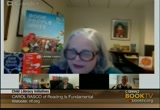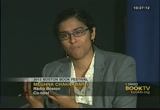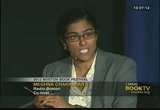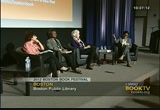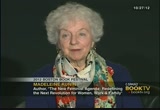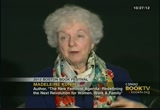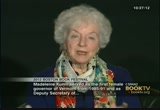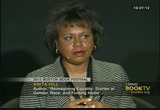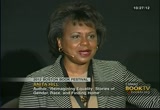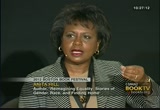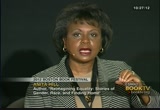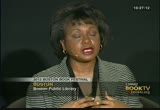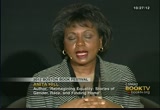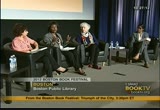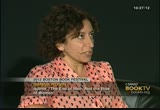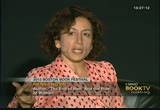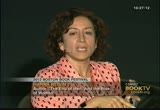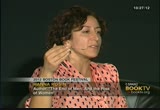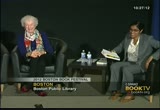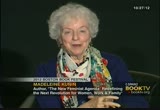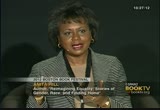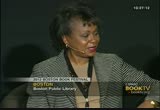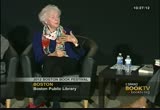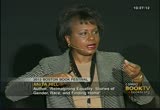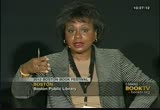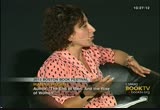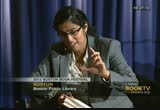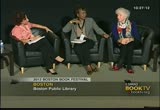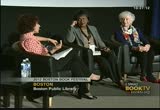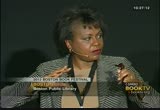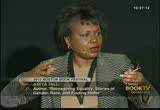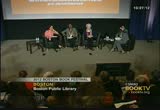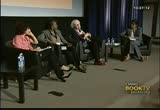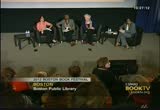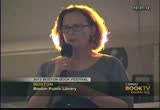tv Book TV CSPAN November 24, 2012 2:30pm-3:30pm EST
2:30 pm
organization money. what is your pet? >> i think it is believe us, there is a gap in the united states and we have to provide the heroes who are serving kids in need with the resources they need. we need geniuses. they are not getting the education they deserve and the books that they need to make your imagination brings life and have an enriched life. this is a workforce issue, a health care issue, it is a civil reissue, people won't vote if they don't know how to read. we have to enrich from the bottom up. that way kids know they can have a chance and they can make a life for themselves. >> carol hampton rasco, what is your pitch? ..
2:31 pm
2:32 pm
>> riff got bored. >> and chief financial officer of first book and the website. >> first book. >> and we thank you both for being on book tv and talking about your reading programs. >> thank you. >> from the fourth annual boston book festival, a panel entitled, what's next for women featuring anita hill, and arose in, and madeline kahn in. this is about an hour. [applause] >> good morning, everyone. such a pleasure to see you all year at what is absolutely one of my favorite advance in the city every year, the boss and books festival. i am co-host of radio boston. [applause]
2:33 pm
>> thank you very much. if you don't listen to this show i'm going to give a shameless plug. 3:00 p.m. monday through friday and, of course, very proud to be a presenting partner for boston but festival because this spirit that brings literally tens of thousands of us together on a day like this inquiry investigation exploration, love of learning and literature, it is a natural combination for the city of boston, boston but festival, and w. b. you are. i'm honored and proud to be here, especially for this panel. and before i introduce the three amazing women who are sitting to my right, a couple of quick reminders. one is that cell phones, if you have already been given that reminder, please turn them off. at the very, very least, silent. since we are in the smart file
2:34 pm
generation, i also ask you to -- i urge you to resist the urge to tweet were facebook or look stuff up during this panel. let's try and create a sacred space where a great conversation is actually the focus. [applause] the other thing, this is being recorded for broadcast on c-span so that everybody knows. and directly after the panel today at 1215 there will be a book signing where all three of these women will be available behind the election of your to sign copies of their buck. reminder on all those fronts. let me introduce three incredible women. 1985 to 1991, governor of
2:35 pm
vermont. later united states ambassador both of switzerland and liechtenstein and is author of this book, the new feminist agenda. then professor anita hill, a professor of social policy, law, and women's studies at brandeis university and author of this new book, rematching equality, stories of gender, race, and finding a home. welcome. [applause] and senior editor at the atlantic and founder of women section. also the author of the end of man and the rise of women. so we start off with a couple minutes from each of you on -- a brief summary or a story from your book that you think best
2:36 pm
encapsulates the ideas that you are presenting. >> thank you very much. it is great to see you all up there and to be here with my sister authoress. what is next for women. my career, my political life really started with the woman's movement in the 70's. and we had great expectations, some of which have been at. the very fact that women today represent 60 percent of undergraduates that uc your friends, daughters, granddaughters becoming doctors to lawyers, things might generation cannot do. women are in the workforce like never before. the traditional family of that goes off to work, mom stance at the doorway wearing a panda form, it hadn't -- if anybody
2:37 pm
remembers that. waves goodbye as these to perfect children stand by her side. usually the boys are a little taller than the girl. that family portrait has been replaced. it is applying now to a 20% of the population. a lot has been received -- achieved. the law of the land. without much controversy after all these years. the misogyny would be under control. women would make at least 30 percent of the congress. now 17%. a lot of statistics. but i think the biggest challenge women face today is how to really take advantage of all of these new opportunities
2:38 pm
and work well providing for their families. that's what i think is the next revolution we have to the create to have policies that the rest of the world already has an american women do not, whether it is paid maternity, family leave, whether it's access to affordable quality child care, whether it's workplace flexibility. until we figure out this conundrum about how to combine family and work, how to really enable a significant contribution to society while still loving and caring for their children, that is what we begin to do. we have to form a new coalition to take this next giant step to
2:39 pm
make it possible for women to do what they really are meant to do . thank you. >> when i first target writing it was precipitated in first by the housing market collapse. and a few years, a couple of years before, sub prime lending spree, banks were engaging in and initiating loans, sub prime loans, in fact, many people qualify for conventional loans. as i was thinking about the panel today i, what's next for
2:40 pm
women, i have to say the last real conversation about what is next for women or when in the public conversation came a few weeks ago when governor romney and the presidents of candid mentioned the binders of women that he received on his desk to help him populate his cabinet. i started thinking about what that binder of women symbolized. it was as though governor romney had to go out and go on a hunt to find women who were these exotic creatures, hiding out in places where there were not really obvious. and in some ways i actually felt his pain in some ways. , because when i started writing about the housing market i found
2:41 pm
that there was very little conversation about the impact that this was having on women. and it was as though women were invisible in this conversation. we talked about it in terms of neighborhoods. we talked about it in terms of people of color, but we have not really started talking about it in terms of women. and there were a lot of numbers that supported a conversation that was specifically about how sub prime lending and the housing market in particular was relevant to women's experience. i can give you some of those numbers. but what i found was that when we started -- when i started actually doing the research, what we were -- what most important was not simply the numbers of how women have been targeted for it sub prime loans
2:42 pm
when they qualify for conventional loans, about how women were more likely, because of owning sub prime loans, more likely to end up in foreclosure, how when word, in fact, more likely to be at risk of housing insecurity because women, especially single women as heads of household were more likely to spend more than 50 percent of their income just to keep a roof over their family said. all of those numbers were compelling, but what i also found very compelling about the stories, as i did my research, was that really women, when they were growing out into the market were not simply looking for housing. there were looking for home. and that the public discourse about -- is about the housing market. and that that really missed what really was at stake here for so
2:43 pm
many people. that instead of looking for -- in the housing market as though we were sort of capturing part of the market, when we think about the quality, what women were looking for was a place for gross. there were looking for a place for personal security. there were looking for a place that allowed them to be empowered to build their dreams and to build on their own dream for the tram to the family. and so it was not as though they were just looking for a piece of the economic market or even a piece of the housing market. and i found that to be true, not only for women, but some men as well. and i tell the story about my great-grandmother who moved from
2:44 pm
-- well, actually was a slave and eventually moved from her slave cabin even after she was emancipated she was living in a slave cabin to move to her own home. what that symbolized her, the freedom, the ownership, but not just in an economic sense. the self sufficiency and the opportunity to become part of our community that it symbolizes now, where does that leave us today? what i think it does in terms of women in the binders as well as all policymakers need to understand that the women are not -- cannot be looked at the populate any kind of, whether it's homes or the workplace for government positions simply so that they can go win and replicate the same stories that
2:45 pm
get told about the space so that we can continue to think of politics in the same way. just like we have women's bodies in those positions. that, in fact, what i'm trying to encourage in this book is a different conversation, a different conversation about what it means to be in a space, how we think about a space, how we think about the neighborhood, how we think about a community, how we think about the role of home. it is more than just an economic unit. in terms of policy, if we continue, for example, to think of the housing market has simply a measure of economic growth, we are going to mess the real meaning of those various units, the home for people. you can't think about it in terms of economic growth because
2:46 pm
what that does is encourage us to make homes more and more and more expensive because it's good for the economy. without thinking about what it does for those of us who are looking to find homes in america . [applause] >> please. >> these guys did such a great job of playing up the issues. again this going to tell a story. before i do that, because i am from washington and because it's halloween and because i have three children, all of some of the church retreat to my will report year that the most popular cost and that is completely is binder full of women. >> what did the selling custom look like? you put your arms in the binder. it's like not at jack in the box . pops out of a little fuller think.
2:47 pm
said we were bell in washington. very creative. i'm just going to tell the story that inspired me to read my book. this began in 2009. the book is based on an atlanta store which cannot in 2010. basically i have been vacationing for a long time which is a pretty prosperous working class town. when you went there. it seemed like it or not that many men around. it seemed like a was not seen them in church, at the fairgrounds, driving down the street, trucks, during construction. this is the height of the housing collapse that anyone talked about. and so men were having a lot of hard time. the loss of a lot of manufacturing jobs. and i really became curious about this. i actually read a novel, i have sci-fi, after pressing working-class novel that same time in which the men had literally disappeared from the
2:48 pm
town. it was a novel about manliness and masculinity, but i had that in my mind when i was at this kind -- town. and became very curious. i ran into this woman in the supermarket. i tell the story in the introduction. it was just her lucky day that she ran into me, extremely nosy reporters his head was full of questions about something. i got to asking her in my usual way a lot of nosy questions. so, that's your kid. who's the dead. why wouldn't you ask a stranger in the supermarket that question. she was very chatty. we got to talking. both she and her daughter told me, yes, there was a dad. yeah, what you live with them? and insisted the same which i heard some many times during my reporting which was rather insulting, but all say it anyway. some version of, we don't live with them because he would be another mouth to feed.
2:49 pm
she said it in a defer way but effectively talked about him like another child she would have to support. so i didn't give the fact that i ask for is phone-number tonight is one to know more. so over time i became invested in their story. i'm sure many of you here are familiar with the old ladies home journal column which has been reproduced as a video series lately to great effect. it's like a wonderful column. i got into this can this marriage be saved note with the two of them brow was always trying to help him get a job or get back together. i became over invested the way reporters do. and it was actually somewhat dysfunctional. you would call me up because he did not up to work the microwave. so why am i telling the story?
2:50 pm
because i realized, where the light bulb went off for me which began my reporting was in realizing that i was going down the wrong path. my idea that calvin and bethany in the perfect family would come back together in one day he was going to take his place at the seat of the table and it was all going to be the way it was, that that was not bowing to happen. why? because something really profound it shifted in the weight that bethany's of herself. she was in college at the time learning to be a nurse. working. taking care for kid. definitely struggling in the way that you guys have described. on the other hand, there was a measure of independence and over -- ownership. that was, it felt very, very different. there was no way you was going to walk in and take the provider breadwinner role the way he had before. that is actually the kind of human spark that led me down this research. 2009. so many new things happening with women.
2:51 pm
that was the year became the majority of the work force. and there was a big study that came out about breadwinner wives who are women who are leading the families. and so i started to think about it in economic terms, and then in the two years since i wrote the book asserted to think about it in emotional terms. what was happening to american marriages, young women in college. and that is where this book drew out of. i think we will talk about this more, but i just want to say, it's not a feminist manifesto. a lot of the stories are so heartbreaking. the way i see it is there are two different stories going on simultaneously. one is the story of struggle and the other is the story of wrigley and press -- this unprecedented switch in generals i do live in washington, so i know what's going on. it's a conversation i have all the time and i hope we will have more of. and then i just want to end by saying what i hope to come out
2:52 pm
is not that we ship all the men to the moon and never see them again because i like my husband and two sons and father and brother. it is more -- and i imagine we will have similar views about this. gender roles and what men can do or what women can do. my son who thinks that the title of my book is like the meanest thing he has ever heard said that to me all the time. he grows up in a world in which he can work four days a week or you can take care of this case or has lost more options without anybody passing them on the playground had tuesday at 3:00 and thinking, what's wrong with that guy. unemployed, something wrong with them? then that will be a better world. >> thank you. obviously much more to talk about then we can cram into half an hour. i do want to remind everyone
2:53 pm
that in the last 15 or 20 minutes there will be audience to monday as well. there will be -- people will have microphones to take questions from folks in the audience. if you can just wait until it gets to you. because of c-span, that would be great. and also, please, as i peppered the three of you with questions, feel free to talk with each other as well. forgive me in advance if i present some decidedly non feminine characteristics by cutting you off a lot and trying to move things along because really your three books present this entire universe of issues for women in the 21st century which deserves a very robust. the start of a something that in no way of three of you touched upon is not directly. and that is the incredible contrast between the visibility of women in 2012. we were hearing about whether 50 percent of the work force in
2:54 pm
some areas, 60 percent of college graduates, many households in which women are the primary breadwinners except drop. the numbers are pretty impressive. incredible visibility in the workplace and at home and in society. and yet at the same time, and i believe you use this term about their relative invisibility of women as well, which i think a lot of people, a lot of women feel that contradiction within the sphere of their own life on a day-to-day basis. of throwing open to anyone who wants to start. how is it that with women as sending in economic, political, and social power still maintain an overall invisibility. >> we are most invisible at the tables where decisions are made about lives. and that think that is the area where we really have work to do. the world economic forum that came out the other day.
2:55 pm
worldwide women have 20 percent of the political power. so we are concerned about access to contraception, concerned about equal pay for equal work we have to be at those tables. and you know, you wash the news or open a newspaper, the huddles of leaders are still largely male. walk into a public building. the state house up the street here boy of the portraits on the walls, their mail. and so women still do not see themselves reflected in the halls of power. you mentioned maybe we should do it the exact way. the short term. you have to do two things. reinvent how power is exercised and what power looks like. the same time you have to get
2:56 pm
their which means you have to play it by the existing rules. i would like to quote a phrase. if you're not at the table you're on the menu. [applause] we actually saw that happening in the discussion about access to affordable contraception in the health care bill. the washington, george washington university law school student could not testify before a panel. she finally found a democratic committee to testify why access to contraception is important. and then rush limbaugh gave further claim to fame when he called her a slut and somebody sent me a button that they thought i would not wear.
2:57 pm
having been called as let. [applause] let me just say, part of the problem is that even with sandra allowed to testify, it made many of us very happy and proud that she was able to testify. what she is coming up against is this dominance that is out there prevailing that these groups of people who are not or may not be listening to have the authority to decide what happens to us. they define what the parameters are. they define what the meaning of contraception is. that is what rush limbaugh was injecting in this devastation. redefine women's sexuality.
2:58 pm
redefine what contraception means. and i am going to define it as being a front. our stories, even when we are sitting at the table are always being perceived as the story of outsiders. and so as outsiders or minority or minimalized, stories that are of minimal significance, always trying to change the whole narrative. even say we belong at the table but then to a change it to say we're the ones who should be defining what contraception means. what it means the entire nation. that is really part of the problem. not just in the conversation, but coming up against all the structures that have been set up
2:59 pm
when we were not in the conversation. >> will we begin to change. i hear what you're saying. on the other hand, women are not a monolith. question is to be more than one. the state of massachusetts got 51 percent of the electorate. there is the opportunity that to that simple beauty, depending on who you vote for, to put more women at the table. ..
3:00 pm
3:01 pm
there is possibly some connection between the kind of added pro-life position they have taken all these years and the incredible rise in single motherhood. ann romney won't even say the words single mother on the stage. she was sort of circle around it that women struggle and that the single father and i am like, why? a single father, they're like a million single mothers. i watch them struggle around this issue of how are we going to make sense of this world that we have created, basically. >> it does show what the republicans are shifting their positions in order to do so. but women, that is where women do have power in this country. through the gender gap. that is not to be forgotten. hopefully they won't just try to
3:02 pm
win us over every four years. [laughter] >> if i may, to a certain degree, it is relatively easy because of the republican party issues that keep coming up together, i am an equal opportunity critic and let me just say that in the second presidential debate, the town hall one, i actually thought the president barack obama's weakest moment was when the young woman stood up and asked him about equal pay for women. he rightfully talked about passing the lilly ledbetter fair pay act. then he abandoned that line of thinking and went on to talk about the economy. that is the moment where mitt romney and the binders full woman came up. [laughter] welcome me about that moment, for example, while the democrats and the president could point to this one act, this one piece of legislation, in truth, there isn't that much more.
3:03 pm
it is easy to say republicans no one in the political spectrum across the board has really done much -- well, besides you. [laughter] to do something about that. >> let me just say that there is pending legislation. the republicans are blocked and you need that second half to make it easier and more practical to really demand fair pay but just going back to the binders, which is a favorite topic, when i was governor, i
3:04 pm
got a lot of applicants for women for jobs. a lot of people had the equations that there was a woman governor. so after going outside of his network to find some women, for that much, i gave him credit, even though he was given a binder by a group of female advocates. ahead of the election. but the other thing you have to look at is immense with resumes. we have to recognize that they are different, at least for my generation. there may be blank spots when you are raising children, that is a very precious time. you know what's going on in your community and the volunteer. a man will look for resume that looks like his. it is. as a woman, when i interviewed a woman who worked at law school
3:05 pm
after she raised her kids, i immediately understood what that resume meant, even though she undersold herself an interview. you can imagine that she got the job. we can't always expect them to be just like men, even in their life story. they may be more qualified by having a slightly different resume that has enriched their experience and has blessed them for a better job. >> i heard a story recently about an employee and i understand this product having hired people myself. the woman never asked for a raise she dispelled grateful that someone loves her work three days a week and i will set beside him every year, but i
3:06 pm
will give it to someone also she doesn't ask for. the scandinavian countries only deepen the problem because what the women there complain about is you lose a year of your career basically because of social pressure, whether you want it or not. but cultural ones are the ones that i've governor the problems. it hasn't been that long, we have made unbelievable strides. but now we are at a very difficult point. >> i agree with part of what you're saying. it seems to me that there are a couple of different problems.
3:07 pm
one is someone has a resume that looks different. and it is only seen perhaps as a minor instead of applause. that is really a cultural problem that we need to try to get over. whenever we see as women, people of color, it is always viewed as a minus. one mitt romney had not at least seen women in business that might've been able to take position. >> he had done so in the private equity world. [laughter] >> especially at that time. but the automatic thing is that
3:08 pm
should be recognized is a even when the resumes are the same, there is a tendency to look at woman is less. we have seen that in a study done by scientists. and they had scientists reviewing the documentation of younger scientists, and regardless, they had people with the same qualifications evaluating by both men and women. both men and women evaluated the exact same thing with the woman's name attached to it. adopt a lower evaluation. they were less likely to be
3:09 pm
chosen. they were less likely to be chosen to give in terms of their pay. if you were having pay, women were chosen to get lesser pay. so there is some definite cultural issues that are going on in terms of bias against women. whether it's women who are different or those who look the same. we need to confront that and understand that an opponent and see really where that is coming from, and we need to unpack that. let me just go to the policy issues. when mitt romney did tell his story, he told a lot about the story about how we treated women in the workplace and what happened. he raised the story about child care when he told about his employee who said i have to go
3:10 pm
home to feed my children. he told the story about a flexible work schedule, whether or not you should have that flexible work schedule, a family woman or a man who needs to go pick up their children in school or fixed dinner for their children who are in school. when he talked about the binders, he talked about whether or not we should have affirmative action so that we can go out and find these women. he talked about equal pay. he said i brought these women in, but did he say whether or not he paid them the same as he paid the man? if he didn't, does he believe in equal pay? but it's more than just i believe in equal pay and you -- that's all going to guess who quality. the question is whether or not that should be part of the
3:11 pm
policy. >> i just want to go back to the point about sweden. you know, if i were 25 years old and about to have a baby, i would much rather live in sweden. you can have child care, you can have a family leave for a year. the only disadvantage about these policies is that sometimes they discriminate against women. but in the nordic countries and some other countries, they are providing maternity care, which is the answer. you either use it or lose it. increasingly, that is taking advantage of this. there is always a question in public policy, you change the public policy first or do you change the law? even new jersey and california have paid maternity leave.
3:12 pm
they are the only states that do so. a lot of people don't take advantage of it because they are afraid that they won't be considered good workers. so we must get to a place in this country where we value the child and we value the mother and, you know, one consequence of our present lack of these policies is we have, in the united states of america, the highest child poverty rate in developed countries, 20%. what does that have to do with family were policies? welcome to, the best answer is still a paycheck. it is very hard for women to work without a network of support on issues like good and affordable childcare and workplace flexibility and paid family leave. so we must put the policies in place. at the same time, as we change the culture. >> i am trying to decide how deep into scandinavia who want
3:13 pm
to go. i would prefer sweden to norway. [laughter] i am totally serious. sweden has done something that no other country has done. they have forced paternity leave as well as maternity leave. if i had my way, we would go to the things that are gender universal. meaning that if we had that maternity leave, we also have paternity leave. do we try to do this in as neutral of a way as possible. the truth is that everybody -- the problem with the american workplace is the penalty that women pay more often than men. but the american workforce -- you know, they punish you severely for doing things for your family. not in every sector, but many sectors do that. if you are a man, they punish even more so. you are almost worse off than an american. >> on that point, please correct me if i'm wrong, some do offer
3:14 pm
maternity leave and men just don't take it. >> yes, sweden has made it difficult not to. they are doing a weird experiment in sweden and this has worked wonderfully. we need to leave a little bit of time for audience questions. i do want to talk about a couple of briefings. talking about raises and in negotiations, the most popular paper is actually one that goes deep into this exact issue and it is entitled, women never ask. they don't ask for additional leave, the onus for promotions or etc. interestingly enough amongst men and women, they found it to be the most transformative. i recently read a georgetown study that showed that one measure in terms of lifetime earnings on average, and in
3:15 pm
terms of lifetime earnings, woman has to have a phd to have the equivalent of lifetime learning of a man who has a bachelors or masters degree. this seems to matter in a world where we have more than 60% of women as part of the workforce. >> i did not know the professors made more money than everybody else. [laughter] again, it is interesting that that paper that you talk about is important and it stands out to people as compelling. but i wonder if you'd asked the question a different way. if you have a man and woman in workplace and the workplace and the woman is not asking for a raise, and the man is not asking for a raise, would-be employer automatically give the rays to the man because, after all, he
3:16 pm
deserves a? and there are different ways that we need to think about this. what happens differently to men and women and woman get it even though they don't ask for it and women who don't ask for it say, well, you are the problem, you are the reason that you are not during the race. and i think that there is a little bit of that going on. it's not because we are discriminating against women that they're not getting raises. it's just that they don't ask for. if they asked were, we give it to them. i'm not sure that i buy that. >> let me just apply that to politics. one of the reasons we have such a dismal record of women in politics compared to the rest of the world, we ranked 90th out of 160 countries and the percentage of women. women don't announce themselves to run for office. study after study has shown that women have to be asked to run. they wake up in the morning and say, i can run for the united
3:17 pm
states senate. [laughter] a woman will be combing their hair in the mirror and say, well, if i run for the school board, i have to take three more courses. the desire to be credentialed, while it's good in many ways, thus the phd, women are very specific about what they think they need. what we have to learn is that we can transfer knowledge from one area to another and that we can learn on the job and we can live on the edge of what we know. that is certainly what i did when i became governor. i thought, how am i going to do this? but you learn. and you have to trust your own self, plus having people around you who think you are great.
3:18 pm
[laughter] >> i just wanted to my favorite story about this, i was interviewing people at google and they were trying to recruit more female executives and computer programmers. they did a survey of their applicants, and they came up with this amazing strategy, which is if you advertise the job and you listed specifically what one needed for the job, you listed eight things that you needed to know, they realize that they got far fewer women are fine. what is the connection? women look at this list and say, oh, well, i can't do three come i can't do three, can-do five comment akin to a promise i'm not qualified. whereas men say, i can do for her. i'm on a. [laughter] so it is the conventional in thing. >> we are running out on time. i just have to ask all of you one last question, and i will and then we will get some brief answers we can turn to the audience questions.
3:19 pm
but people start raising their hands so the microphones can gravitate towards your now. that would be great. i am opening a can of worms with my last question, and i apologize. but one thing that i noticed about this issue of what is next for women. by virtue of, you know, the good necessity, i wonder how much are we doing a disservice to the true complexity and diversity of what woman is in the united states now. because a lot of the books deal with issues that matter to only those women who may be upper middle class, upper class, college educated, affluent women. other books deal with, you know, there is a diversity within what it means to be a modern-day american women that oftentimes get lost in the discussion when we talk about women. how much does that matter?
3:20 pm
class and race are endlessly important issues. they further defines a woman and her opportunities. >> the women's movement was accused by the next generation of not being sensitive enough, that it was in upper-middle-class movement not being sensitive enough to poor women and gay and lesbians and women of color. all of those things very much play a role. and i think that the press loves to divide us, working women versus the stay at home mothers. the truth is that most women go through different stages of life. i was home with my four children for up to 10 years. unfortunately, they have very little memory of the brownies that i baked and the pickles that i pickled.
3:21 pm
[laughter] but i took time off and i then i stepped back in. yes, every time you generalize about women, you leave somebody out. but we can't have a conversation unless we are sensitive to it. one example, a woman in upper management can negotiate paid maternity leave most of the time. when she is not feeling well, she can call in sick. one lower income women can be fired on the spot for being sick because she has no power to negotiate anything. that is why we do need the ability to earn sick days. because we have to not rely on
3:22 pm
just to your bosses, how well you can negotiate time off. be a basic and fundamental right. some businesses do it on their own. those who get left out are usually the most vulnerable. they are the ones that need the greatest opportunity. it becomes a way of life that we respect families and we grabbed back the family values. it should not be about gun control and same-sex marriage, but really have values that value families. [applause] i am being told that we have 10 minutes total left and i would like to thank both of you. >> let me just say in this very room with a number of you, i was introduced by an individual who some of you might know. judge feigenbaum as a mentor and
3:23 pm
friend of mine. he was known after he stepped down and one thing he told me was i can never talk about race without talking about gender anymore. i have made that commitment. so when i hear things about general neutral policy and how race neutrality has and has not worked, i think we really need to be informed by all of these ways that we are seeing is different. we need to take into account as much as we can. people say can you talk about gender -- i can't. because i let both of them. i lived both of the experiences. when i'm talking about one in the way i experience it, i'm really talking about both.
3:24 pm
so i think it is difficult to have a conversation. what we really have to avoid is assuming that we can't address the way that we look at differences all at once. that race must trump gender were all that's been women together, it has to trump a conversation about what it means to be a lesbian woman were talking about women altogether has to trump talking about our differences as we age through life and the issues that we confront throughout our lifetimes. so that is what i find really problematic and i don't think we make a good job of it. i think you're absolutely right. the only thing i would say is that we really have to talk about women altogether.
3:25 pm
i think we are going to do that, then we better make sure that a whole variety of us is represented in that conversation >> i will be very faster. i agree with you. it occurred to me at some point the way this phenomenon unfolds, there is a complete decline in marriage among the non-college-educated and something different happening with women there. there is the new forms of marriage and strengthening of marriage among college educated, and this was another way in which there was a glowing class. i do think the experience is very similar, especially being a woman in the workplace for a lot of those issues are pretty common. >> when i read your book and hear your story, i see a story
3:26 pm
-- it's like oh, we are discovering that now there are men who aren't able to find jobs and support their families. this is a story we have been living. so that is why i say that i think we all sort of have to be represented and we need to recognize that these are not unique stories one group. >> we have time for one more question? my apologies to everyone in the audience. who has the microphone? okay, i will stand up so you can see me better. i'm just wondering if perhaps part of the problem with women getting equal pay is that so few women take on what they call the science education act. as the only woman in my program back in the 80s.
3:27 pm
is there a way we can sort of push the younger generation to take those harder courses and face more of those barriers? >> there is an ability to do that. then you do, but in this situation, as i discovered, that women, even though they have the same qualifications, they are not treated equally. we also have to encourage women. that is where women have not made a significant of a leap as they had in law and medicine. it starts early. i think it starts in kindergarten or you have to encourage that. and i saw that same study. be that as it may, women are willing to make a lot more money
3:28 pm
in those fields. >> is there something you want to say? we have time for one more question. >> no, go ahead. go ahead and let the other people talk. >> okay. sandra fluke is one who wants an orgasm subsidized by taxpayer dollars. maybe if limbaugh had used the see word to describe her,. >> if you have a question, that would be better. [laughter] >> desirable countries -- that's very white of you [booing] [booing] >> did you have a question?
3:29 pm
we would like to talk to someone who has a question, please. >> yes, i have a question. there is actually a way in which this conversation today mirrors a conversation that men have about these issues were about the issues that face our country that constantly make me feel as if i am left out. because i'm single. all of this conversation is directed towards families and family values, and yet i believe the majority of women in the country today are actually single. many of them may be younger. some of you assume they will aspire after those kind of lives. but i don't see you very much talking about single women. this is something that i don't believe we should divide up into different pieces. but i don't often hear myself and other women like me reflected in these
78 Views
IN COLLECTIONS
CSPAN2 Television Archive
Television Archive  Television Archive News Search Service
Television Archive News Search Service 
Uploaded by TV Archive on

 Live Music Archive
Live Music Archive Librivox Free Audio
Librivox Free Audio Metropolitan Museum
Metropolitan Museum Cleveland Museum of Art
Cleveland Museum of Art Internet Arcade
Internet Arcade Console Living Room
Console Living Room Books to Borrow
Books to Borrow Open Library
Open Library TV News
TV News Understanding 9/11
Understanding 9/11
